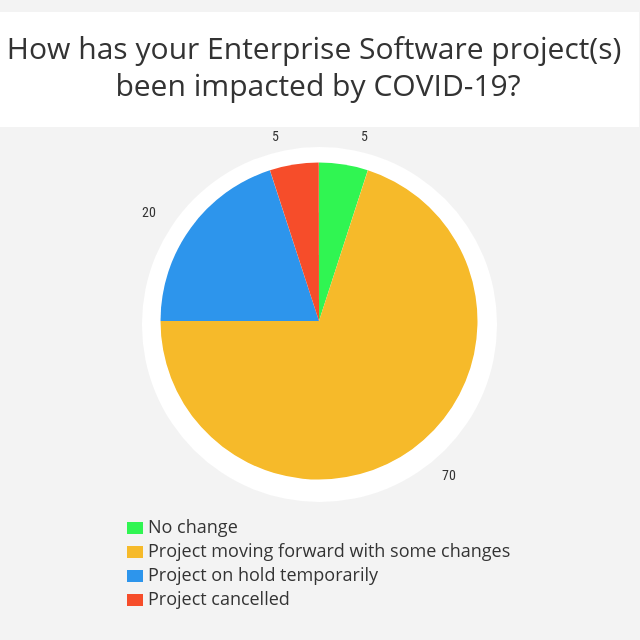Are projects still moving forward?
The majority of those we spoke with say that projects are still moving ahead, with changes either to timeframe or scope. Our early estimates based upon an informal poll are that 5% of projects are moving forward with no changes, 70% are moving forward with some changes (timeframe/scope), 20% are on hold temporarily and roughly 5% have been cancelled or postponed indefinitely (particularly in industries most hard hit). We are still in the early days and will continue to monitor trends over the next weeks / months.
> “There has been no impact to any of my engagements and my model is unique as I focus on new implementations, production support and strategic planning,” says Jarret Pazahanick, SAP and SuccessFactors Consultant. “I am seeing several very large companies in the industry (not my customers) suspend all non-critical IT spend and suspend their HR Technology projects. I would expect due to the capital intensive nature of ERP / HCM projects and overall cost, there could be 1-2 year delay on large new implementations and items pushed further out on the roadmap, but areas like production support (maximize and stay compliant in what we have), procurement and some areas of strategic planning will be busy.”
> A project team member on a global Workday project, 6 months from completion said that large face-to-face meetings have now moved to Zoom and Microsoft Teams, but that the project will move ahead as planned as of now. He sees this as a chance to make up for lost time to “get the project back on track.” (Industry: Professional Services)
> Julie Koegenboeg, Chief Operating Officer, Continental Europe at Enterprise Software vendor, Unit4: “We are fully committed to the ongoing delivery of our customer projects. We have put in place robust measures to enable our Professional Services teams to work remotely if they need to, and we have the infrastructure in place to deliver against current commitments and deadlines. We’ve added extra training, test and a demo environment for Unit4 employees so there will be no impact to customer quality or success.”
> Luke Marson, President of SAP Systems Implementer, iXerv (North America): “We are not seeing too much disruption to ongoing active projects, but we are seeing a strong slowdown in the procurement and commencement of new projects at existing and new customers. Luckily iXerv’s consultants are used to remote working, so there is little-to-no impact in that area.”
> Atik Srl, an Italy-based Information Technology & Services firm: “In Italy COVID-19 has had a brutal impact on our ERP implementations. The project start dates have been substantially moved by a few weeks, but basically the customers do not want to stop–and we are there for them. In Italy we say “Andrà tutto bene.” Translation: “Everything will be fine.” (Source.)
> Matthew Davies, President of Rizing HCM, North America: “For the most part, our projects are moving forward, although we’ve seen a few pause. We have seen an uptick in work relative to HR transactional processes–and have customers that are now needing help to onboard large groups of employees, particularly in the grocery and supply chain businesses.”
> Jessie Pappis, Director of Client Engagement at Veritas Prime : “Some projects have been paused, as a result of downstream impact, but not the majority. SIs / consulting partners are used to working remotely, but many of our customers are not. We’re seeing them (their project teams and IT departments) having to adjust to that new world of work first and that is their first priority right now. We see some leaders are carrying on as “business as usual” and looking at this as an opportunity to catch up and get tasks done, but the entire impact can’t be known yet. Things like budget impacts as a result of revenue losses may not have been communicated down the line yet.”
> Sam Spector, SVP of Professional Services at Onesource Virtual: “We pivoted to 100% virtual/remote project work across our global professional services quite easily. We’re seeing some of our customers experience some disruption as they do the same; mostly in the form of cancelled/rescheduled meetings as they adjust to their remote situation and focus on COVID-19 response plans. The biggest disruptions we’re seeing within our project portfolio are Hospitality and Oil & Gas customers, but even there we see customers intent on project progress and speed-to-value of their Workday investment.”
What tools have emerged as particularly helpful in managing these projects now remotely?
Remote work tools have gotten the stress-test of their lives, some signing up millions of subscribers in this week alone. While speed and up-time wasn’t optimal in some cases, (3) main application themes we’ve heard emerge are:
– Microsoft Teams
– Zoom
– Slack
> Jon Reed from Digninomica published this insightful interview this past week about “Remote Work and When It Matters Most.” He interviewed AvePoint, who has roughly a third of employees in the Asia/Pacific region. When the Coronavirus outbreak hit, AvePoint had to respond quickly to keep remote workers productive in four Chinese cities. “Productivity is harder than technology.”
> Jarret Pazahanick: “Several of my customers, particularly in the area of Payroll are having to quickly transition to a remote setup. I know some firms have really struggled with not having laptops available, or who don’t have a suitable VPN/Network capability and have had to scramble. Something tells me when the COVID19 pandemic is behind us a lot more firms will have plans in place and be willing to embrace remote working. At the end of the day if you are a company that does not trust their mission critical employees to work from home you are not hiring the right employees.”
> David Ogilvie, Independent ERP Consultant posted this thread on LinkedIn, which provided some crowd-sourced insight on practical tools to help teams now delivering services remote. From that thread: “I am making even more use of MS Teams features and working harder to communicate more frequently within the team (consultants, key users and stakeholders combined). Our teams are thinking sensibly about what the next few weeks hold…. It’s about choosing the right project battles to have and which to accept need to be delayed.” – David Ruston, D365 Consultant
– Matthew Davies, Rizing HCM: Smartsheet has proven especially helpful for their consultants and customers for Content Collaboration and data sharing.
What advice would you have for customers (or SIs) who are in the middle of an implementation or project right now?
> Industry Analyst, and author of The (Right) Deal, Brian Sommer: “Determine what is a discretionary versus compulsory project for your organization. SIs need to prepared to be nimble, and pivot like hell if need be.”
> Josh Greenbaum, Principal, EA Consulting / CEO, ProQ : “I think the first thing everyone should do is check in on your teams and make sure everyone is okay and has access to the services they need to be safe and healthy. If possible, employees need to be reassured that they will have jobs and – I’m embarrassed to say this in front of my European colleagues – they will still have health insurance going forward. These are difficult times for everyone, and compassion and empathy need to be the first order of business.
I would suggest everyone continue full steam ahead with their projects. Most of us thrive on having purpose and on being needed, and work can be a great psychological stabilizer in troubled times. So everyone get to work, maintain a regular, disciplined schedule, dress like you’re going to the office, and stay professional. But keep it light and mellow, be compassionate and understand that people who may have loved ones impacted by the virus or the fallout from the virus are under a lot of stress, so be forgiving and kind to one another.
Use this time to experiment with remote team skill-building. Everyone (except Jon Reed 😊) could learn to upskill their multi-media communications chops, and working collaboratively online isn’t necessarily something all of us are good at. Yet.
Make use of online resources, particularly the online learning systems that most vendors provide.
And cameras on in all meetings. I know that may be controversial, but non-verbal communications – smiles and frowns – can be as important as spoken words.
> Jarret Pazahanick: “My recommendation would be dependent on a lot of factors such as: How much work/cost is really left? What is the real ROI on the project? Is it still a top priority for our company? Can we really afford to do this? Do we still want to use our top people on this project? My immediate thoughts are if you are close to go-live (few months or less), then move forward. All other projects should be evaluated, and the number 1 priority for companies should be ensuring they have all “hands on deck” both from an employee and dollar perspective to weather the storm of what could be a brutal recession. HR Technology is obviously important but many companies will be fighting for survival (and government bailouts) so making the right strategic decisions in coming weeks will be paramount.”
> Luke Marson: “For customers that are currently on a project, I would assess whether the project go- live is going to add significant value versus holding off while the pandemic is ongoing. The biggest challenge at the moment is the uncertainty over when the virus cases will begin to subside. At present, it may be necessary to pause any projects until there is more clarity.”
> Sam Spector: “For clients that are up and running on Workday, it is our view that the rapid shift to the remote/virtual workforce model provides numerous opportunities to leverage the product in ways they may not have previously envisioned–from driving a whole new employee experience, to tracking and managing time off and productivity, to leveraging the platform as communication channel that can deliver timely consistent messages and collect direct employee feedback to conducting performance reviews.”
Final thoughts…
While we are not certain about much that will happen in the 6-8 weeks, we can be certain that it will alter our course in Enterprise Software and Consulting faster than any other period in recent history. We’ll continue to monitor this situation and its impact on projects, teams and success. Now is the time to take inventory, refocus on what really matters (both at home and in business) and come out stronger for it.
—————————————-
For over 25 years, Bonnie Tinder has worked with top Enterprise Software companies leading implementation, marketing and sales initiatives. In 2018, she founded Raven Intel—a peer review site for Enterprise Software Consulting, designed to help customers make a well-informed choice in an implementation partner.



